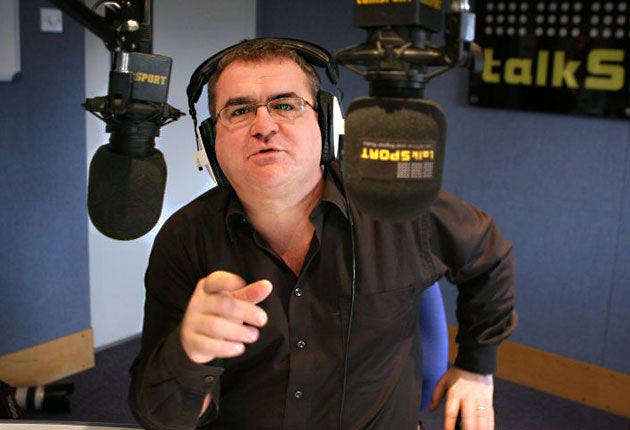Your support helps us to tell the story
From reproductive rights to climate change to Big Tech, The Independent is on the ground when the story is developing. Whether it's investigating the financials of Elon Musk's pro-Trump PAC or producing our latest documentary, 'The A Word', which shines a light on the American women fighting for reproductive rights, we know how important it is to parse out the facts from the messaging.
At such a critical moment in US history, we need reporters on the ground. Your donation allows us to keep sending journalists to speak to both sides of the story.
The Independent is trusted by Americans across the entire political spectrum. And unlike many other quality news outlets, we choose not to lock Americans out of our reporting and analysis with paywalls. We believe quality journalism should be available to everyone, paid for by those who can afford it.
Your support makes all the difference.Broadcaster Jon Gaunt, who called an interviewee a "Nazi" on air, lost an appeal today against a High Court ruling that media watchdog Ofcom was justified in upholding complaints against him.
Gaunt's contract was terminated by TalkSport in November 2008, 10 days after an exchange with councillor Michael Stark.
During a hearing last month, the Court of Appeal was told that Gaunt's live interview with Mr Stark about Redbridge Council's decision to ban smokers from becoming foster parents - for which he later apologised - drew 53 complaints from listeners.
Mr Stark said the welfare of children should outweigh the needs of foster families but Gaunt, who was himself in care, accused the councillor of being a "Nazi", a "health Nazi" and an "ignorant pig".
Last summer, Gaunt challenged Ofcom's June 2009 finding that the interview failed to comply with the broadcasting code but the High Court backed Ofcom.
Three Court of Appeal judges today rejected his appeal against the High Court's decision.
Giving the ruling of the court, the Master of the Rolls, Lord Neuberger, said: "Freedom of expression - that is, the right to say what one wants and how one wants, and to impart and to receive information and ideas - is a fundamental human right.
"In the light of the power of language, ideas and information, freedom of expression underpins a free society."
Lord Neuberger, who heard the case with Lords Justices Toulson and Etherton, said freedom of expression had been described as "the lifeblood of democracy".
But he added: "However, like virtually all human rights, freedom of expression carries with it responsibilities which themselves reflect the power of words, whether spoken or written.
"Hence the need for some restrictions on freedom of expression..."
The need for some restrictions was recognised by Article 10 of the European Convention on Human Rights, in which freedom of expression was now "enshrined".
As the "limited number" of circumstances for restriction identified in that Article recognised "any attempt to curtail freedom of expression must be approached with circumspection".
Ofcom's finding in relation to the Gaunt interview "was essentially based on the proposition that it caused significant and unnecessary offence".
Lord Neuberger said it was important to observe that the Broadcasting Code recognised that "offensive material or language will often be justifiable, but justifiability must be assessed by reference to the context".
He announced: "In summary, when one combines the extremely aggressive tone of the interview, the constant interruptions, the insults, the ranting, the consequent lack of any substantive content, and the time which the interview was allowed to run on, it seems to me clear that Ofcom was right to conclude that there had been a breach of... the Code."
It had been suggested that Ofcom attached too much weight and too much offensiveness to the "Nazi", "health Nazi" and "ignorant pig" insults levied at Mr Stark.
But Lord Neuberger said: "In my view, however, Ofcom quite correctly took those insults into account, but only as a factor among others which, when taken together, rendered the interview in breach of... the Code."
By the time Ofcom's finding was published, Gaunt had already been dismissed and there was no suggestion, said the judge, that "he has lost any particular work as a result of the finding".
He added: "His reputation as a very hard-hitting journalist may mean that the finding has done him no damage, but, if it has, it does not only appear to be hard to identify, but it would be an inevitable consequence of any system of controlling broadcasts.
"That point serves to underline the importance of anxiously scrutinising any curb on freedom of expression, but it goes no further than that, and anxious scrutiny is precisely what Ofcom gave the matter."
An Ofcom spokesman said later: "We are pleased that the Court of Appeal has agreed with Ofcom that Jon Gaunt's interview was a breach of the Broadcasting Code.
"The Court of Appeal agreed that the interview had an extremely aggressive tone combined with constant interruptions, was full of insults, ranting, and lacked any substantive content and that it was a breach of generally accepted standards.
"Parliament gave Ofcom a duty to ensure that whilst standards in programmes are maintained, the right to freedom of expression is also protected.
"Ofcom regularly makes decisions under the Broadcasting Code that respect and balance these principles."

Join our commenting forum
Join thought-provoking conversations, follow other Independent readers and see their replies
Comments